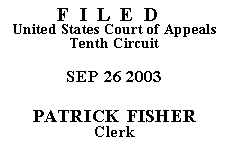

| EARL L. PAGEL, |
(D. Utah) |
Before EBEL, HENRY, and HARTZ, Circuit Judges.
Earl L. Pagel, a Utah state prisoner filed this pro se 42 U.S.C. § 1983 action against Utah prison officials alleging that: (1) his removal from the Sex Offender Treatment Program and the accompanying reduction in privileges and prejudice to his chances for parole violate his due process rights; (2) the prison grievance system is inadequate and therefore violates his constitutional rights; (3) the defendants' failure to provide an adequate law library and adequate legal assistance violates his constitutional right of access to the courts; (4) prison officials violated the Americans with Disabilities Act (ADA), 42 U.S.C. §§ 12101-12213, by refusing to provide him with a typewriter to prepare court documents and assignments required for his treatment program. Mr. Pagel sought injunctive relief and damages.
The defendants filed a motion to dismiss or in the alternative for summary judgment. While that motion was pending, a magistrate judge entered an order staying discovery until the court ruled on the motion. Subsequently, the district court dismissed Mr. Pagel's due process, inadequate grievance, and access to the courts allegations for failure to state a claim, and granted summary judgment to the defendants on Mr. Pagel's ADA claim.
Because Mr. Pagel is proceeding pro se, we must construe his pleadings liberally. See Haines v. Kerner, 404 U.S. 519, 520 (1972). However, "in analyzing the sufficiency of the [pro se] plaintiff's complaint, the court need accept as true only the plaintiff's well-pleaded factual contentions, not his conclusory allegations." Hall v. Bellmon, 935 F.2d 1106, 1110 (10th Cir. 1991). We engage in de novo review of both the district court's dismissal of Mr. Pagel's due process and access to the courts claims, see Sutton v. Utah State Sch. for the Deaf & Blind, 173 F.3d 1226, 1236 (10th Cir. 1999), and the district court's grant of summary judgment to the defendants on his ADA claim, see Kendrick v. Penske Transp. Servs., Inc, 220 F.3d 1220, 1225 (10th Cir. 2000). We apply the same standards as the district court pursuant to Fed. R. Civ. P. 12(b)(6) and Fed. R. Civ P. 56.
Upon review of the record and the applicable law, we conclude for substantially the same reasons as set forth by the district court that Mr. Pagel's due process and right of access to the courts claims should be dismissed for failure to state a claim, and that the defendant Utah prison officials are entitled to summary judgment on Mr. Pagel's ADA claim. See Rec. doc. 28 (Dist. Ct. Order, filed March 6, 2003). Moreover, the magistrate judge properly exercised his discretion in staying discovery pending the district court's rulings on the defendant's dispositive motions. See Diaz v. Paul J. Kennedy Law Firm, 289 F.3d 671, 674 (10th Cir. 2002) (ascertaining no abuse of discretion in the district court's ruling staying discovery pending resolution of a summary judgment motion). Finally, as the defendant prison officials have noted, to the extent that Mr. Pagel seeks to challenge decisions affecting his parole, he must pursue a petition for a writ of habeas corpus rather than a § 1983 action. See Reid v. McKune, 298 F.3d 946, 953 ("'[W]hen a state prisoner is challenging the very fact or duration of his physical imprisonment, and the relief he seeks is a determination that he is entitled to immediate release or a speedier release from that imprisonment, his sole federal remedy is a writ of habeas corpus.'") (quoting Preiser v. Rodriguez, 411 U.S. 475, 500, 93 S.Ct. 1827, 36 L.Ed.2d 439 (1973)). 411 U.S. 475, 500 (1973).
Accordingly, we AFFIRM the district court's decision dismissing Mr. Pagel's due process, inadequate grievance, and access to the courts claims and granting summary judgment to the defendants on his ADA claim.(1)
Entered for the Court,
Robert H. Henry
Circuit Judge
*. This order and judgment is not binding precedent, except under the doctrines of law of the case, res judicata, and collateral estoppel. The court generally disfavors the citation of orders and judgments; nevertheless, an order and judgment may be cited under the terms and conditions of 10th Cir. R. 36.3.
1. In light of the disposition of this appeal, we DENY Mr. Pagel's Motion to Expedite Case Due to Further Draconian Punishment as moot. Ronald Bailey's Motion for Leave to Become an Amicus is denied.